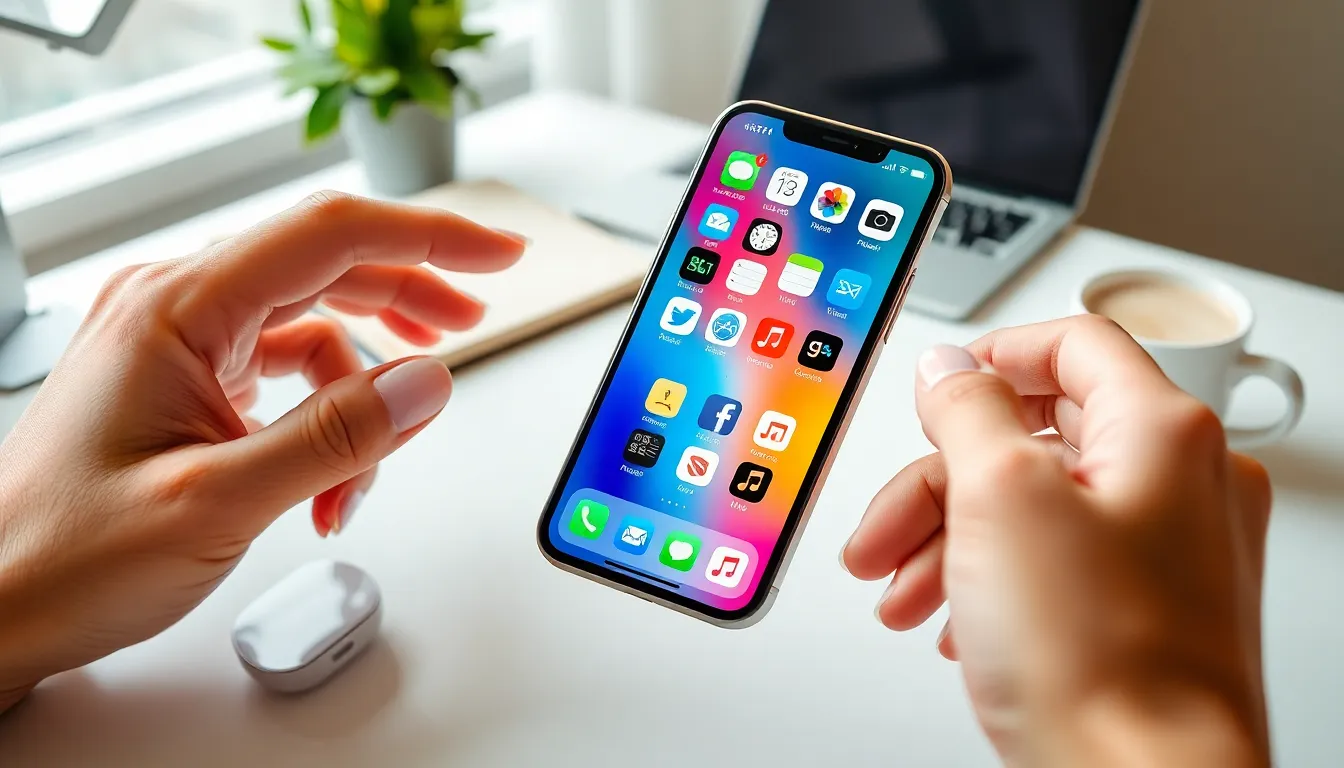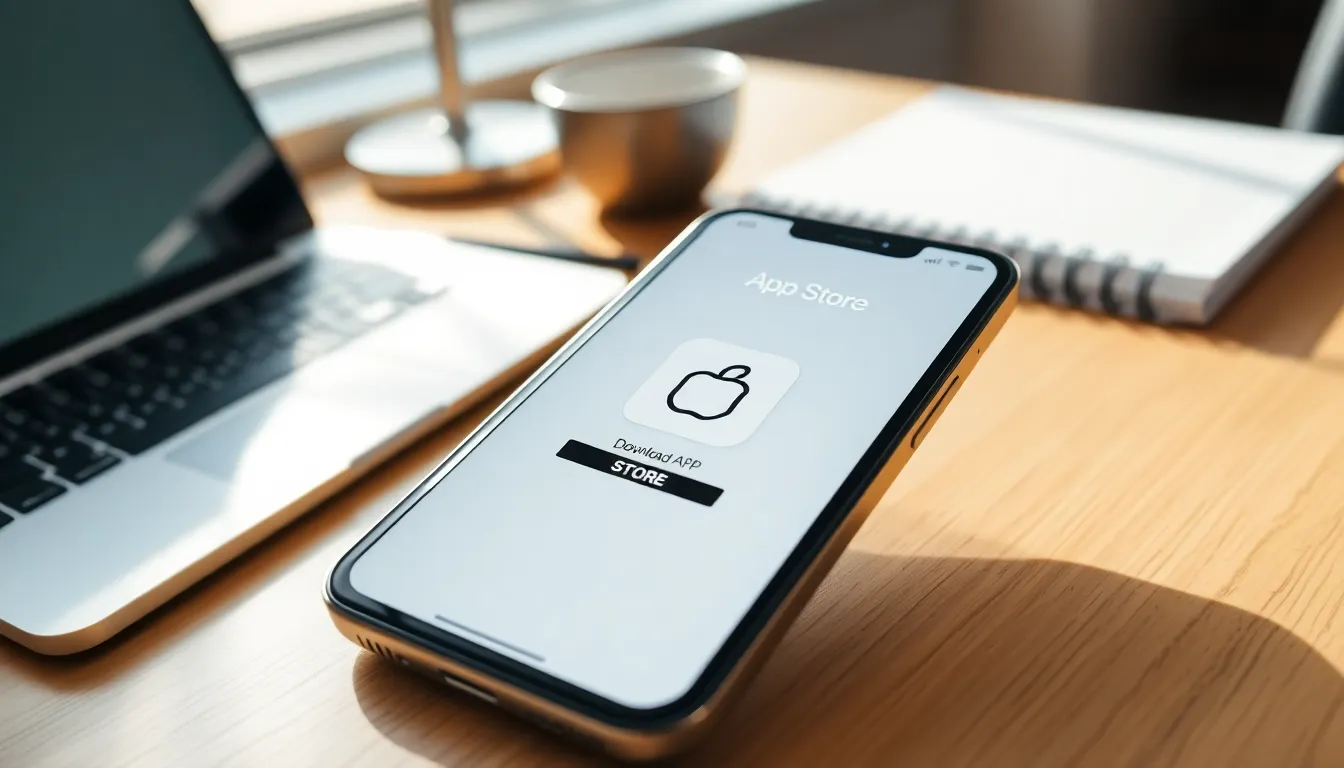In a world where stress can feel like a second job, mental health support apps are stepping in like a superhero with a Wi-Fi connection. Gone are the days of waiting weeks for an appointment or trying to decipher the mysteries of life over a cup of lukewarm coffee. These apps offer a convenient and often entertaining way to tackle mental health challenges, all from the comfort of your couch—pajamas welcome.
Imagine having a therapist, cheerleader, and life coach right in your pocket, ready to help you navigate the ups and downs of life. With features ranging from guided meditations to mood tracking, these digital companions are designed to empower users and make mental wellness accessible. So why not give them a shot? After all, who wouldn’t want a little extra support during life’s rollercoaster ride?
Table of Contents
ToggleOverview of Mental Health Support Apps
Mental health support apps provide immediate access to tools and resources that enhance emotional well-being. Users often find features like guided meditations, mindfulness exercises, and cognitive behavioral therapy techniques. Many options exist, catering to various needs, from anxiety management to personal growth.
Features include mood tracking, which allows users to log their emotions and identify patterns. In addition, reminders for self-care activities encourage healthy routines. Some apps also offer community support, allowing individuals to connect with peers facing similar challenges.
Data suggests that 1 in 5 adults experience mental health issues, highlighting the importance of accessible support. App use has surged, reflecting a shift towards digital solutions in therapy. Individuals can download these apps on smartphones or tablets, ensuring support is available anytime, anywhere.
Popular apps include Headspace, Calm, and BetterHelp, each offering unique approaches to mental wellness. For example, Headspace focuses on meditation techniques, while BetterHelp connects users to licensed therapists for virtual sessions. These apps serve various demographics, ensuring inclusivity and tailored support.
Quality of resources varies among apps, so reviewing user feedback and expert recommendations is beneficial. Many apps offer free versions or trial periods, making it easy for users to explore before committing. Accessibility remains a key strength, especially for those hesitant to seek traditional therapy.
Through consistent use, mental health support apps can complement professional treatment and enhance overall quality of life. Driven by technology, these digital solutions improve mental health management and empower users to prioritize their wellness effectively.
Types of Mental Health Support Apps
Mental health support apps come in various forms, each tailored to specific needs. Users can choose from therapy-focused apps, mood tracking apps, and mindfulness and meditation apps.
Therapy-Focused Apps
Therapy-focused apps provide users with access to licensed therapists. Many of these platforms, like BetterHelp and Talkspace, offer virtual therapy sessions through messaging, video calls, or phone calls. Immediate support forms the backbone of these apps, allowing individuals to connect with professionals easily. Some services even include personalized treatment plans based on user needs. Options for subscription plans often exist, giving users a flexible approach to enhance their mental well-being.
Mood Tracking Apps
Mood tracking apps assist users in monitoring their emotional states daily. Tools like Daylio and Moodfit enable individuals to log feelings and identify patterns over time. By visualizing emotions through charts and graphs, these apps help articulate mental health journeys. Users gain insights into triggers that affect moods, allowing for proactive management. Some platforms include journaling features to capture thoughts and encourage self-reflection, fostering personal growth.
Mindfulness and Meditation Apps
Mindfulness and meditation apps offer guided practices designed to reduce stress and anxiety. Popular choices include Headspace and Calm, with a variety of meditation sessions catering to different experience levels. Users can find everything from short sessions for quick relief to longer practices for deeper relaxation. These apps often feature breathing exercises and sleep aids to enhance mental clarity and promote well-being. Emphasis on daily availability invites consistent engagement, supporting users in cultivating mindfulness habits.
Features to Look For in Mental Health Support Apps
When selecting mental health support apps, specific features enhance user experience and effectiveness. Considering these aspects can lead to better mental wellness outcomes.
User Interface and Experience
An intuitive user interface simplifies navigation. Visual appeal and responsive design improve overall engagement with the app. Easy access to resources encourages consistent use, helping users integrate mental health practices into daily routines. Incorporating personal elements, like custom reminders and tailored content, can enhance the connection between users and the app. Clear organization of tools and features also aids in finding what individuals need when they need it.
Privacy and Security
Privacy and security remain paramount in mental health support apps. Users require assurance that their personal data remains confidential. Assessing an app’s security measures, such as encryption and data storage policies, plays a critical role in establishing trust. Compliance with regulations like HIPAA further ensures that health information is protected adequately. Transparent privacy policies outline how data is collected and used, allowing users to make informed decisions before committing to a specific app.
Professional Support and Resources
Access to professional support significantly impacts the effectiveness of mental health apps. Availability of licensed therapists for real-time consultations can provide timely interventions. Many apps offer resources such as articles, videos, and interactive tools to supplement professional advice. Regular updates from mental health experts ensure that content stays relevant and grounded in current research. Additionally, having a community space for shared experiences can foster connections, creating a support system among users.
Benefits of Using Mental Health Support Apps
Mental health support apps offer numerous advantages that enhance users’ overall well-being. They provide tools and resources tailored for effective mental health management.
Accessibility and Convenience
Accessibility and convenience stand out among the benefits of mental health support apps. Users can access these digital platforms anytime, making it easier to seek help when needed. They eliminate barriers posed by long appointment waits, allowing individuals to engage with mental health resources from home or on the go. Plus, many apps feature user-friendly interfaces that promote interaction. Individuals can quickly navigate through options, whether seeking relaxation techniques or mood tracking features. Immediate support becomes achievable with just a few taps on a smartphone.
Cost-Effectiveness
Cost-effectiveness plays a significant role in the popularity of mental health support apps. Many apps offer free versions, enabling users to explore valuable resources without financial commitment. Paid subscriptions often come at a fraction of traditional therapy costs while providing similar benefits, including access to licensed professionals and personalized support. Individuals save money while prioritizing their mental health, and numerous apps offer affordable in-app purchases for additional features. Users can tailor their experiences to fit their budgets, ensuring mental wellness support is within reach.
Limitations of Mental Health Support Apps
Mental health support apps offer various benefits, yet they also come with limitations that users should consider.
Lack of Personalization
Personalization remains a significant shortcoming for many apps. While these platforms offer general mental health resources, they often lack tailored approaches for individual needs. Users may benefit from customized plans developed by professionals, which apps typically do not provide. Most algorithms cannot assess complex emotional states effectively. Users experiencing specific mental health conditions such as severe anxiety or depression find that generic strategies may not meet their needs. Consequently, reliance on app-generated suggestions may limit a user’s ability to fully address their unique mental health challenges.
Potential for Dependency
Dependency on mental health support apps poses another concern. Users sometimes rely heavily on these tools for emotional support, potentially detracting from seeking guidance from professionals. While these apps offer immediate access to resources, over-reliance can limit the motivation to engage in face-to-face therapy. Individuals who turn to apps for coping strategies might find themselves avoiding necessary professional intervention. This could lead to a diminished quality of care in the long run. To ensure safety, users must balance app usage with real-world support and professional treatment options.
Conclusion
Mental health support apps are transforming the way individuals approach their mental wellness. By offering accessible resources and immediate support they empower users to take charge of their mental health journey. While these apps provide valuable tools for stress management and emotional tracking they should complement rather than replace professional treatment.
As users explore the wide range of features available it’s essential to remain mindful of the potential limitations. Striking a balance between app usage and traditional therapy can lead to more effective mental health care. With the right approach these digital companions can significantly enhance overall well-being and foster a healthier mindset.







